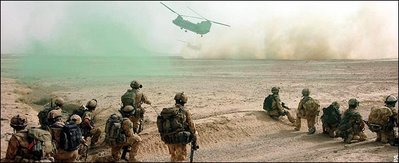Wounded to get millions in compensation (Victims of CRIME, not war)
 British troops wounded in Iraq and Afghanistan will be paid compensation on a sliding scale of about £1,000 for a small facial scar, up to a maximum of £500,000 for the loss of a limb
British troops wounded in Iraq and Afghanistan will be paid compensation on a sliding scale of about £1,000 for a small facial scar, up to a maximum of £500,000 for the loss of a limbThe difference between a Democracy and a corporatacracy.
British troops wounded in Iraq and Afghanistan will be paid compensation on a sliding scale of about £1,000 for a small facial scar, up to a maximum of £500,000 for the loss of a limb
Forty injured servicemen are to receive payments of up to £500,000 each in a series of test cases. This is expected to lead to claims from hundreds more of the estimated 1,000 troops injured in combat in Iraq and Afghanistan since 2001.
Payments will be made on a "sliding scale" of about £1,000, for a small facial scar, up to a maximum of £500,000, for the loss of a limb. The ruling was agreed, it is understood, after Government lawyers raised fears that the Ministry of Defence (MoD) could be subject to a legal challenge by troops claiming they were victims of crime because they were wounded in Iraq after the end of "at war" hostilities in May 2003.
All those injured fighting in Iraq and Afghanistan, but who have decided to remain in the Army, could be entitled to lodge claims with the newly revised Armed Forces' Criminal Injury Compensation (overseas) scheme.
This is similar to that run by the Home Office, which makes payments to the victims of crimes such as muggings, rape, burglary and robbery. Troops will be informed officially of the new policy in the next few weeks and the first payments will be made in early spring.
Until now, the MOD has paid "criminal" compensation only for incidents where troops were injured in "civilian situations" such as a fight in a nightclub while off-duty.
Those injured in Northern Ireland during the Troubles were also eligible for such compensation because it was deemed that the terrorists attacking them were criminals and not enemy combatants in a conventional war.
LinkHere




0 Comments:
Post a Comment
<< Home